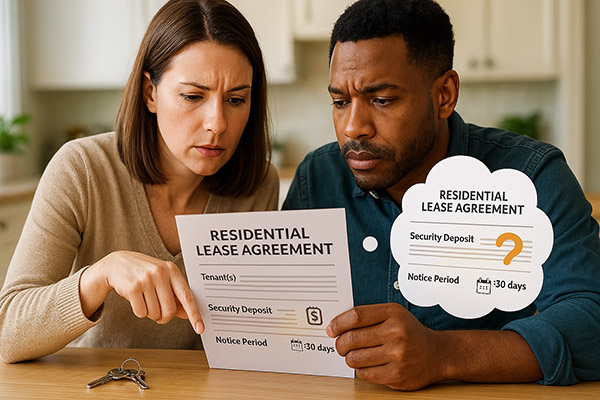Lease Loopholes: Protecting Yourself as an Individual Renter
Finding the right place to live is exciting, but the rental or lease agreement you sign is a legally binding contract packed with clauses that primarily protect the landlord. Signing without fully understanding your rights and obligations can lead to disputes over deposits, unexpected fees, privacy invasions, and difficulty moving out.

Common Traps: Why Reviewing Your Residential Lease is Crucial
Landlords and property management companies use standardized leases, but these often contain terms that heavily favor them. As a tenant, you need to be aware of potential pitfalls before you commit:
- Security Deposit Headaches: This is a frequent point of conflict globally. Does the lease clearly state the conditions under which deductions can be made (beyond normal wear and tear)? What is the exact procedure and timeline for the deposit's return after you move out? Unclear terms make it easier for landlords to unjustly withhold your money.
- Unexpected Rent Increases & Fees: How and when can rent be increased? Is there a cap, or is it tied to market rates or inflation? What is the required notice period? Also, look for hidden fees – late payment penalties (are they reasonable?), fees for returned checks, or even fees for specific amenities or rule violations.
- Maintenance & Repair Delays: Who is responsible for fixing essential items like plumbing, heating/cooling, or major appliances? More importantly, what is the process for reporting issues, and what is the expected timeframe for repairs? Vague clauses can leave you waiting indefinitely for crucial fixes.
- Termination & Renewal Surprises: Understand the notice period you must give before moving out (often 30-90 days). What are the penalties if you need to break the lease early? Does the lease automatically renew for another term if you don't give notice by a specific date? Missing these dates can lock you into another year or lead to significant fees.
- Landlord's Right of Entry: While landlords typically have the right to enter for inspections or repairs, the lease should specify the required notice period (e.g., 24 hours) and limit entry to reasonable times and purposes. Overly broad clauses can feel like an invasion of privacy.
- Strict Rules & Regulations: Leases often include addendums with rules about guests, noise levels, pets (including specific breed/size restrictions or fees), parking, or making alterations (even painting). Are these rules clear and acceptable for your lifestyle? Violations can lead to warnings, fees, or even eviction.
- Subletting & Assignment Restrictions: Life changes. What if you need to move temporarily for work or want someone else to take over your lease? Many leases heavily restrict or forbid subletting or assignment without strict landlord approval, limiting your flexibility.
Assuming the lease is "standard" or fair is risky. Every clause matters, and understanding them upfront empowers you to negotiate changes or, at minimum, know exactly what you're agreeing to.
Gaining Clarity with Personas.Work
Reading through pages of dense legal text can be exhausting and confusing. Personas.Work simplifies the process for individual renters:
- Lease-Specific Q&A: The AI recognizes residential leases and asks pertinent questions about security deposit handling, rent increase mechanisms, repair responsibilities, notice periods for termination/entry, and common restrictions (pets, alterations).
- Identifying Unfavorable Terms (RAG): Personas.Work flags clauses that might be problematic for tenants. An unusually high late fee might be 'Amber', unclear deposit return terms could be 'Red', while a standard notice period might be 'Green'.
- Tenant Perspective: The analysis inherently views the lease from your perspective as the tenant, focusing on your rights and potential liabilities.
- Plain Language Explanations: Understand why a clause is flagged. Personas.Work explains the potential real-world impact of specific terms, like how an automatic renewal clause works or what "normal wear and tear" typically excludes.
- Highlighting Areas for Clarification: The suggestions often point out ambiguous language or areas where you might want to ask the landlord for clarification or propose a modification before signing (e.g., "Request clarification on the exact conditions for security deposit deductions," "Confirm the policy on minor wall hangings").
Example Scenario: The Deposit Dispute Avoided
Alex is renting an apartment in London. The lease seems okay, but when analyzed with Personas.Work, the Q&A about the security deposit return process reveals the lease only vaguely mentions deductions for "damages". It lacks specifics on timelines or the process for disputing deductions. The AI flags this as 'Amber', suggesting Alex request an addendum clarifying the timeframe for return (e.g., within 14-30 days as often required by local regulations) and the requirement for an itemized list of any deductions. Alex discusses this with the letting agent, who agrees to add a clearer clause, potentially saving Alex a future dispute over getting his deposit back.
"I almost missed the auto-renewal clause in my lease! Personas.Work flagged it during the Q&A. Realizing I needed to give 60 days' notice to avoid being locked in for another year saved me a lot of potential hassle and money when I decided to move."
- Maria Garcia, Tenant
Rent Smart: Know Your Lease Before You Sign
Your rental agreement defines your home life and financial obligations for the duration of your tenancy. Don't treat it like a formality. Taking the time to understand the conditions regarding your deposit, rent, repairs, privacy, and ability to move out prevents future stress, conflict with your landlord, and unexpected financial hits. Using a tool like Personas.Work provides invaluable clarity, highlighting potential risks hidden in the fine print and empowering you to sign your lease with confidence, knowing exactly what you're agreeing to.
Make your next move a smooth one. Analyze your rental agreement with Personas.Work.